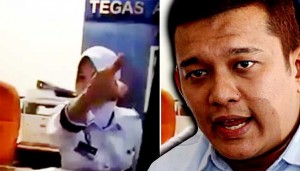Where is the rule of law? Are we a law unto ourselves?

Within 18 days, nine arrests. It is the same man who has been arrested and re-arrested repeatedly nine times in 18 days! This must be unheard of anywhere else in the world but this is Malaysia – the Bolehland!
P Ramakrishnan, Aliran Exco Member
Every time he is released by the court or denied application for his extended remand, the police continue to re-arrest him. It is almost like telling the court, whatever your view or reason for denying our application, we will prevail, we will circumvent, we will still get our man one way or another. That’s how Sanjeevan was repeatedly arrested and detained.
In anticipation of the court’s possible refusal to extend the remand order, fresh reports have been made the previous day to enable his re-arrest following the rejection of the police application for an extension. It was all well planned in anticipation of the court’s ruling.
We are told that 14 investigation papers have been opened against Sanjeevan. According to theSun, “these reportedly include allegations for falsifying documents, cheating, defamation, and offences under the Immigration Act 1959/63 and Anti-Money Laundering and Anti-Terrorism Financing Act 2001.”
It is amazing that all these so-called criminal activities had gone undetected and unreported until his sudden arrest on 22 June. We are told that the police remain vigilant but how did these many so-called criminal activities go undetected previously. These criminal activities could not have happened overnight. There must be a history of prolonged activities.
He had been detained and questioned and statements presumably taken and possibly culminating in a dossier of information that would have been sufficient to charge him in a court of law – but he has not been brought to court and charged.
He has been in detention for 18 days to facilitate police investigation – a period deemed long enough to unearth the necessary substantive evidence to damn him. Surely there must be damning evidence for at least one case to be charged in court. Why has this has not happened?
The failure to charge him in a court of law makes some wonder whether all the allegations of criminal activities were without substance. Could they be just insinuations and mere speculation? But we don’t have any answers yet.
The fact that he was finally arrested under the Prevention of Crime Act (Poca) means the police need not disclose any details or justify their action. They cannot be held accountable. This Act is akin to the abolished infamous ISA.
Under this Act, a detainee can be held for long periods or restricted to “geographical area, which can range from a village to a state, compelling the person to wear electronic monitoring devices, or two years’ detention without trial”.
The fact that he was finally detained under Poca could be interpreted to mean that the police really have very little or nothing to charge him for his alleged criminality. The police have not come out with any clarification as to why he had to be detained under Poca.
Many will agree that the title of this Act is a misnomer. This Act does not prevent crimes but only provides punishments. If the intention of the Act is “prevention of crime” – as the title implies – clearly it had not prevented Sanjeevan from committing the so-called crimes for which he was allegedly detained.
According to his lawyer, “they just produced (a written statement) to the magistrate and claimed there are sufficient grounds to detain, but the statement was not given to the defence,” he said.
Being not well-versed with the legal procedure, one can be excused for asking whether a court has the moral obligation to be fully satisfied that there are actual legal and binding grounds for detention under Poca. Additionally, shouldn’t the police statement be extended to the defence for their satisfaction as well? Why has it to be one-sided?
Whatever the crime or criminality might be, everyone must be entitled to the just process of the law. Natural justice is the fundamental right of every individual. He or she cannot be denied this right.
But when the rule of law is no longer supreme or sublime, we descend to the rule of the jungle. Is this what is happening? In a civil society, this is totally unacceptable.
Sanjeevan’s father is right in questioning his son’s detention under Poca. “Poca is for hardcore criminals. My son hasn’t been charged in any court so why are they detaining my son under Poca? It is too heavy…”
Every detention of a person only confirms the many accusations levelled against the police regarding the deplorable treatment of accused persons in police detention.
According to his lawyer, Preakas Sampunathan, Sanjeevan complained that he was never taken for proper medical attention despite having a heart problem. Sanjeevan also complained that he was once blindfolded when a doctor checked him. Why was there a need to blindfold him during a medical check up? This arouses suspicion whether he was examined by a bona fide doctor or a fake.
Sanjeevan’s case only highlights our shortcomings as a democratic nation. Repeated arrests after a court has denied the police application for an extended remand makes a mockery of our justice system. Denying medical treatment to an accused person reveals our lack of humanity. Beating up detainees only shows the break-down of the rule of law. We are anything except democratic.
We call on the inspector general of police to charge Sanjeevan in a court of law failing which he should be released. Charging him under Poca is an abuse of a law that should not exist.

